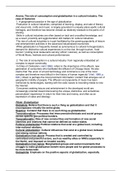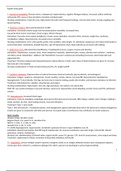Samenvatting
Summary for reading from week 6
- Instelling
- Erasmus Universiteit Rotterdam (EUR)
- Boek
- Globalization
Good summary for the reading of Ritzer (2015) Globalization A Basic Ch2; Velthuis (2013) Globalization of markets for contemporary art- why local ties remain dominant in
[Meer zien]










